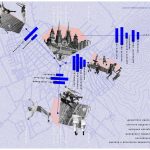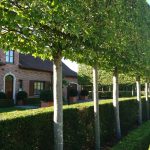Undergraduate studies (Bachelor)
Study program landscape architecture
The landscape architecture study program is very diverse and probably one of the most multidisciplinary programs that can be studied. Rarely does a program offer such a wide range of types of knowledge that can be significant not only as professional knowledge and skills, but also as part of general education.
Geomorphology, pedology, climatology, botany, ecology, urbanism, etc. are studied through the subjects of the landscape architecture study program, as segments of basic knowledge. Learning about plants is a particularly important part of the study, which reveals an incredibly rich and diverse plant world.
Social sciences are also present through the study of the history of garden art, landscape architecture and urban development. In addition to the theoretical knowledge, learning various skills is important. These are the skills of understanding space, drawing, application of modern technologies in the processing of spatial data (geographic information systems) and techniques of spatial representation (computer graphics).
Which areas make up the landscape architecture study program?
The profile professional areas of landscape architecture are the application, i.e. the synthesis of knowledge and skills of various sciences, engineering and art.
The field of planning is represented through subjects related to urban development and the subject Landscape planning and arrangement. The research approach to urban, rural and natural landscapes is based on the application of landscape-ecological principles and the visual assessment of landscapes. By applying modern technologies in the field of analysis, evaluation and interpretation of characters, landscape plans are made in which the system of green infrastructure, the system of open spaces of the city as well as the visual assessment of the character of the landscape are elaborated.
Landscape architectural design is represented through several subjects that differ in the type of objects they deal with (gardens, open spaces of apartment blocks and institutions, parks, squares, etc.). The field of design is based on knowledge, but to a greater extent it is an artistic and engineering skill of creating an environment, i.e. making projects for the arrangement of open spaces.
In the field of landscape engineering , through several subjects, knowledge and skills are acquired on how to build landscape architecture objects, how to manage them and how to maintain and nurture them. The subjects are based on science, but they also include practical knowledge and skills, as well as field work.
In the field of landscape horticulture the study program includes subjects that deal with research in the field of biology, physiology and ecology of plants, production technology and integrated protection of ornamental plants and management of landscapes and protected natural assets. These subjects are oriented towards working with plants, and include work in laboratories, nurseries and in the field.
Every student can find something interesting within the study program of landscape architecture. In addition to that, no subject is one-sided. Almost every subject is a synthesis of different kinds of knowledge and skills, which was supported by the following statement of Professor Stevan Milinković: “Landscape architecture – It is the art of synthesis“.
What is the purpose of the study program?
The purpose of the study program is to educate students and future professionals in the field of landscape architecture for the following jobs:
● Planning of landscapes, green infrastructure and a network of open urban spaces, recreational and tourist areas and areas of nature protection,
● Monitoring and work on solving problems related to nature conservation and environmental protection,
● Development of landscape-architectural projects of parks, gardens, open spaces of the city, recreational areas and garden-architectural elements,
● Landscape engineering in the establishment and maintenance of green spaces and
● Production of planting material for landscaping, as well as the protection of ornamental plants.
Upon completion of the study program, the student acquires knowledge and skills to work in the practice of landscape architecture, as well as the right to continue education in a master’s degree program.
What are the outcomes of the study program?
The outcomes of the learning process within the study program Landscape Architecture are based on the descriptors of qualifications, and the requirements and recommendations of the European Federation of Landscape Architects (EFLA), the European Association School of Landscape Architecture (ECLAS), as well as the appropriate European qualifications framework and the requirements of international and national professional associations.
In the course of study, students do not write a final paper but they produce synthesized work in a profile field in the form of professional practice defined as a study activity.
Timetable by semesters and years of study in the study program of undergraduate studies Landscape Architecture
Number of exams: 40 (31 compulsory + 9 elective)
Academic title: Graduate engineer of landscape architecture (abbreviated: Grad. Eng. Landscape. Arch.).







